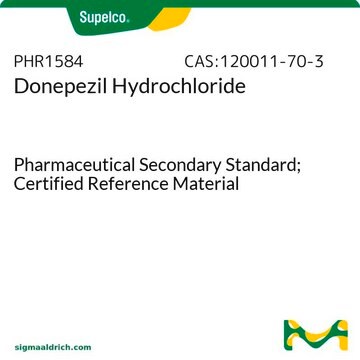D6821
Donepezil hydrochloride
≥98% (HPLC), powder, acetylcholinesterase inhibitor
Sinónimos:
1H-Inden-1-one, 2,3-dihydro-5,6-dimethoxy-2-[[1-(phenylmethyl)-4-piperidinyl]methyl]-, hydrochloride, E2020
About This Item
Productos recomendados
product name
Donepezil hydrochloride, ≥98% (HPLC)
assay
≥98% (HPLC)
form
powder
storage condition
desiccated
color
white to off-white
solubility
DMSO: ≥20 mg/mL
H2O: ≥20 mg/mL
storage temp.
room temp
SMILES string
O=C1C(CC2CCN(CC3=CC=CC=C3)CC2)CC4=CC(OC)=C(OC)C=C41.[H]Cl
InChI
1S/C24H29NO3.ClH.H2O/c1-27-22-14-19-13-20(24(26)21(19)15-23(22)28-2)12-17-8-10-25(11-9-17)16-18-6-4-3-5-7-18;;/h3-7,14-15,17,20H,8-13,16H2,1-2H3;1H;1H2
InChI key
HLJIZAKUNCTCQX-UHFFFAOYSA-N
Gene Information
human ... ACHE(43)
¿Está buscando productos similares? Visita Guía de comparación de productos
Application
Biochem/physiol Actions
Features and Benefits
signalword
Danger
hcodes
Hazard Classifications
Acute Tox. 2 Oral - Eye Irrit. 2
Storage Class
6.1A - Combustible acute toxic Cat. 1 and 2 / very toxic hazardous materials
wgk_germany
WGK 3
flash_point_f
Not applicable
flash_point_c
Not applicable
Certificados de análisis (COA)
Busque Certificados de análisis (COA) introduciendo el número de lote del producto. Los números de lote se encuentran en la etiqueta del producto después de las palabras «Lot» o «Batch»
¿Ya tiene este producto?
Encuentre la documentación para los productos que ha comprado recientemente en la Biblioteca de documentos.
Los clientes también vieron
Nuestro equipo de científicos tiene experiencia en todas las áreas de investigación: Ciencias de la vida, Ciencia de los materiales, Síntesis química, Cromatografía, Analítica y muchas otras.
Póngase en contacto con el Servicio técnico










![(E)-2-[(1-Benzylpiperidin-4-yl)methylene]-5,6-dimethoxyindan-1-one(Donepezil Related Compound A) Pharmaceutical Secondary Standard; Certified Reference Material](/deepweb/assets/sigmaaldrich/product/images/201/641/49c7b91b-630d-4c54-9fe2-8ac8e483c7cd/640/49c7b91b-630d-4c54-9fe2-8ac8e483c7cd.jpg)
